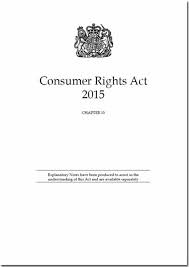
October 1, 2015, by Richard Hyde
Happy Consumer Rights Act Day!
Today is the day that the Consumer Rights Act 2015 comes into force. According to the Government Press release, this will make the law easier to understand, and enable consumers to buy, and businesses to sell, with confidence. It puts a number of consumer rights into one place, and makes some important changes to the law that applies when consumers purchase goods, services of digital content.
Right to a refund where goods are not satisfactory
The Consumer Rights Act reflects the standards that were required of goods by the previous legislation. Goods must be satisfactory and must be fit for purpose. Where they are not, the primary right available to consumers will be to return goods within 30 days and recieve a full refund. Whilst such rejection of the goods had previously been possible, the timeframe in which consumers were able to do this was unclear, leading to refusals by traders to honour this right. Of course, where the goods are perishable, the time period will be reduced. The right to reject an piece of fruit does not last 30 days! If a consumer chooses not to exercise the right to reject, or if the 30 days have elapsed, they are able to demand a repair or replacement of the item in question. Only if the replacement or repair fails to bring the goods into confrmity with the contract will a refund be possible.
Digital Content
Before the introduction of the Act, when a consumer brought an app or downloaded a movie, it was unclear how faults would be handled. Some academics argued that the digital content should be treated like goods, where as others though that it was more like a service. From today the rights and remedies that apply in the purchase of digital content are clearly defined. Digital content is a third catagory of product, neither good nor service, although like goods it must be satisfactory and fit for purpose. If the digital content is not satisfactory orfit for purpose, or indeed does not match a demonstration which induced the contract, the consumer will be entitled to a repair or replacement to bring the digital content into line with thier entitlements, and if this is impossible a price reduction or refund. In addition, however, if an app damages your hardware the trader must repair your hardware or provide you with compensation.
Services
Where a service provider fails to exercise reasonable care and skill in performing the service a consumer will be able to require him or her to do it again. So where an electrition fails to properly peerform a rewiring the consumer will be able to ask the electrician to perform the task again. Where repeat performance is not possible, or where the trader does not comply with the request, the consumer is entitled to a price reduction, including a reduction of the price to nothing.
Unfair Terms
The Act brings together all the law governing the legality of contractual terms. Terms in all consumer contracts must be fair. Some terms are automatically void (such as those that seek to exclude liability for personal injury or death) and some are contained in a so-called greylist, which identifies terms that have the potential to be unfair. Where a greylisted term appears in the contract the courts will be particularly keen to examine the circumstances of the case in order to evaluate whether the term is fair or otherwise. Where term is unfair it will not apply. Further, traders must ensure that
Not only, but also…
Although the Consumer Rights Act is likely to steal the headlines, it is merely one part of the wide ranging reforms to consumer law that have taken place in recent time. This time last year the consumer was given new rights to claim damages where a trader had enaged in misleading or aggressive practices prior to making a contract. There have been new regulations which allow consumers to cancel contracts and which tell traders the information that they must give to consumers before the contract is made. And traders must now identify an Alternative Dispute Resolution platform competent to deal with disputes between them and thier consumers, although they do not have to agree to use the provider in thier disputes. The idea is that this will reduce the costs for both parties and allow mutually acceptable settlements to disputes between consumers and traders.
No comments yet, fill out a comment to be the first

Leave a Reply